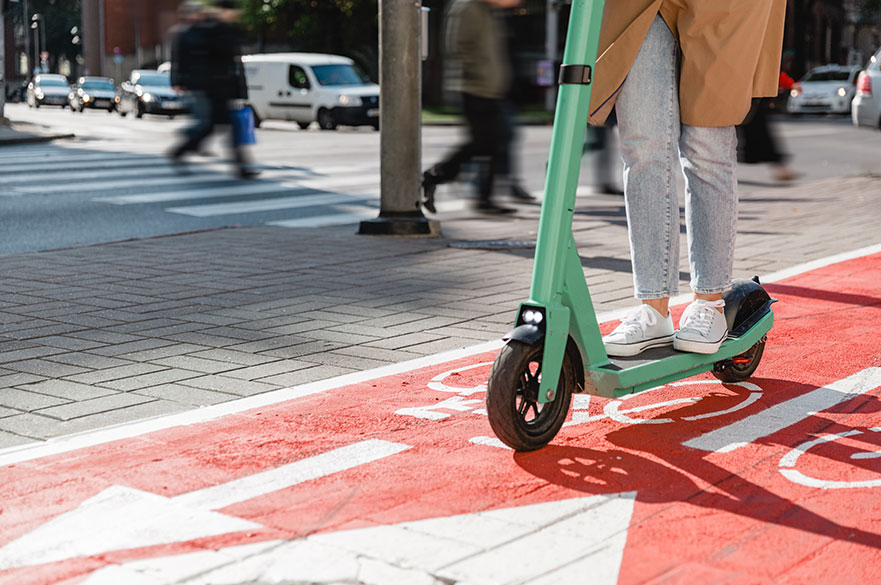Frequent e-scooter use linked to riskier riding habits
Frequent e-scooter riders are more likely to engage in risky and illegal riding behaviour, according to research which explored how riding experience influences hazard perception and response.
By Helen Breese | Published on 13 February 2025
Categories: Press office; Research; School of Social Sciences;

The first-of-its-kind study by Nottingham Trent University (NTU) psychologists used bespoke video-based tests featuring real e-scooter footage filmed from the rider's perspective.
More than 185 participants were assessed on their ability to predict hazards and their willingness to engage in risky riding situations, such as running red traffic lights, overtaking, and speeding.
Their riding experience was also measured by months of riding experience and frequency of riding.
Results showed that increased riding experience did not associate with improved hazard prediction or the ability to judge risks; in fact, all frequent riders reported a higher percentage of engagement in illegal riding behaviour compared to less frequent riders. This was the case in scenarios such as overtaking and speeding, but not with traffic lights.
The findings support a report from the UK Department for Transport (DfT) which noted that 40% of e-scooter collisions could be attributed to user error.

Dr Petya Ventsislavova.
Dr Petya Ventsislavova, lead researcher and senior lecturer at NTU’s School of Social Sciences, said: “A possible reason for this risk taking could be that increased riding experience leads riders to become more confident in their skills rather than more cautious, making them more inclined to engage in risky riding behaviours.
“However, all participants reported a tendency to engage in risky behaviour, perhaps reflecting the widely-held perception that e-scooters are less serious and dangerous than other modes of transport.”
The research also emphasised that using e-scooters for short trips might restrict riders' exposure to different situations, which could hinder the development of their hazard and risk awareness skills.
Dr Ventsislavova added: “E-scooter riders often use these vehicles for short trips in city centres, typically along familiar routes with predictable environments that don't challenge their hazard prediction abilities. This means that even frequent riding during these short trips may not offer enough opportunities to improve their skills, which could explain the connection between riding frequency and a willingness to take risk.
“The rapid global adoption of e-scooters, introduced with relatively short notice and without safety guidance or clear regulations, may also have led to an optimism bias among riders, where they believe they are more skilled and less likely to face negative events.
“Without official e-scooter training and standard safety guidelines, there's no clear definition of proficient riding skills, especially cognitive ones. Consequently, riders may use personal judgment to determine what is risky and what constitutes a hazard.”
The research recommends the introduction of tailored hazard perception training for e-scooters - similar to the driving hazard perception test which has been shown to increase drivers’ awareness of their own limitations in risky situations – in order to significantly improve hazard perception skills and reduce crash risks for e-scooter users.
Notes for Editors
Press enquiries please contact Helen Breese, Public Relations Manager, on telephone +44 (0)115 848 8751, or via email.
About Nottingham Trent University
Nottingham Trent University (NTU) has been named UK ‘University of the Year’ five times in six years, (Times Higher Education Awards 2017, The Guardian University Awards 2019, The Times and Sunday Times 2018 and 2023, Whatuni Student Choice Awards 2023) and is consistently one of the top performing modern universities in the UK.
It is the 3rd best modern university in the UK (The Times and Sunday Times Good University Guide 2023). Students have voted NTU 1st in the UK for student employability (Uni Compare 2025)
NTU is the 5th largest UK institution by student numbers, with over 40,000 students and more than 4,400 staff located across six campuses. It has an international student population of almost 7,000 and an NTU community representing over 160 countries.
NTU owns two Queen’s Anniversary Prizes for outstanding achievements in research (2015, 2021). The first recognises NTU’s research on the safety and security of global citizens. The second was awarded for research in science, engineering, arts and humanities to investigate and restore cultural objects, buildings and heritage. The Research Excellence Framework (2021) classed 83% of NTU’s research activity as either world-leading or internationally excellent.
NTU was awarded GOLD in the national 2023 Teaching Excellence Framework (TEF) assessment, as it was in 2019.
NTU is a top 10 for sport (British Universities and Colleges Sport league table 2023).
NTU is the most environmentally sustainable university in the UK and second in the world (UI Green Metric University World Rankings, 2023).